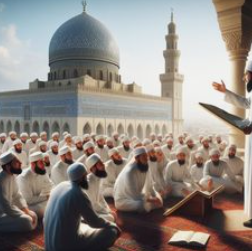Today’s topic is the Battle of Khyber. This war was fought against the Jews. Previously, a truce was signed with the Prophet Muhammad (PBUH) for 10 years with the Quraysh. Let’s first discuss how this war began.
The people of Khaybar did not show hostility to the Muslims during the life of Mecca or in the early days of Islam. But after giving shelter to the Banu Nazir tribe, their attitude began to change. The Banu Nazir tribe fled from Medina and took refuge in Khaibar, and from the moment they took refuge, the Jews there began to be hostile towards the Muslims. The Battle of the Trench brought together the Quraysh and the people of the Ghadafar tribe and incited them to fight. Local influential leaders in Khyber assured that the Gaddafi tribe would be given huge sums of money and they formed a military alliance.
The most opportune time to attack Khaybar was after the Treaty of Hudaybiyah, as the Quraysh were inactive at that time due to the treaty. The Battle of Khyber took place in the seventh year of the Hijri. Twenty days after returning to Medina after concluding the Treaty of Hudaibiyah, the Prophet (peace and blessings of Allaah be upon him) led the expedition to Khaibar. The strongest Jewish base in the entire Arab world was in Khaibar.
The Muslims knew that they would conquer Khaibar because Allah had given them the good news of the conquest of Khaibar a few days earlier. Allah says in the Quran that:
Certainly was Allah pleased with the believers when they pledged allegiance to you, [O Muhammad], under the tree, and He knew what was in their hearts, so He sent down tranquillity upon them and rewarded them with an imminent conquest. And much war booty which they will take. And ever is Allah Exalted in Might and Wise.
(Quran 48:18-19)
The Muslims continued their journey and reached a place called As-Safwan. The area was south of Khaibar. The Prophet stopped there and prayed the afternoon prayer. The Muslims reached very close to Khaybar. At night, the Muslim army set up camp in a valley called Al-Razi. The place was between Khyber and a place called Gadafan so that no help from Gadafan could reach Khyber.
When the Jews of Khaybar went out to collect water in the morning, they found that Muslims had surrounded them from all sides. The terrified Jews rushed into the fortress, shouting, “Mohammed’s army is coming, Mohammed’s army is coming.” The Prophet (peace and blessings of Allaah be upon him) besieged their fortress.
The Prophet (peace and blessings of Allaah be upon him) knew in advance that the Jews had 7 to 8 forts in Khaibar, so they, the Jews, would not be able to unite and fight against the Muslims.
The Prophet (peace be upon him) announced that tomorrow I will give the flag to a person through whom the gates of the fort will be opened and whom both I and Allah like. The next day, the Messenger of Allah (peace and blessings of Allah be upon him) gave the flag to Ali (may Allah be pleased with him) and ordered him to fight. Then the companions led by Ali (RA) advanced and after 10 days, the Muslims conquered Khaybar.
The Muslims then advanced towards the AS WARd Fort, which was conquered in three days. This battle was led by Hafs (may Allah be pleased with him). Then the Jews took refuge inside the fort of Zubayr, but due to lack of water, they came down and fought with the Muslims. In this battle, some Muslims were martyred. But this fort also fell and the Muslims emerged victorious.
In this way, one by one, all the Jewish fortresses were captured. Finally, the Jews came down to make a peace treaty.
Now let’s discuss what lessons we can learn from the Battle of Khyber. The first lesson is that the dangers of greed for leadership. We can learn from a hadith of Tirmidhi today how terrible it is to think about the greed of leadership. The Messenger of Allah (peace and blessings of Allah be upon him) said: If two wolves were sent to a goat, the goat would suffer the same amount of loss as the one who has greed for leadership in his heart.
The second lesson is that the purpose of jihad is. When the Prophet (peace be upon him) gave the flag to Ali (may Allah be pleased with him), he told him to call the Jews to Islam because the main purpose of Islam is to bring people under the banner of peace, even if it is through aggressive war.
The third lesson is that if someone tries to get close to Allah, Allah will reward him with good.
After the Battle of Khaibar, the Prophet (peace and blessings of Allaah be upon him) allowed the Jews to cultivate the land because at that time the Muslims were busy spreading Islam and carrying out various campaigns. The Muslims gained a huge amount of booty from the Battle of Khaibar, which set the Islamic economic wheel in motion. The Muslims gained a huge amount of booty from the Battle of Khaibar, which set the Islamic economic wheel in motion. Their names are Wadiya Kara and another one is Taima.
The Jews of the Wadiya Kara region were called upon to surrender, but they prepared to fight, but on the second day their resistance collapsed and they were forced to surrender. A treaty was made with them, similar to the Battle of Khyber, and the people of the Taima region were asked to surrender without fighting.

